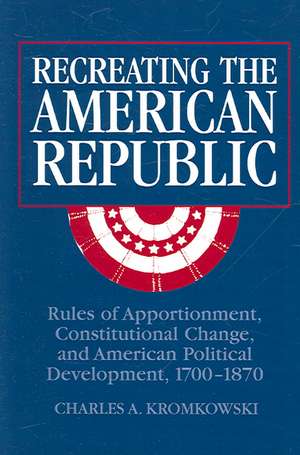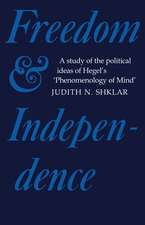Recreating the American Republic: Rules of Apportionment, Constitutional Change, and American Political Development, 1700–1870
Autor Charles A. Kromkowskien Limba Engleză Paperback – 9 noi 2005
| Toate formatele și edițiile | Preț | Express |
|---|---|---|
| Paperback (1) | 279.49 lei 43-57 zile | |
| Cambridge University Press – 9 noi 2005 | 279.49 lei 43-57 zile | |
| Hardback (1) | 678.97 lei 43-57 zile | |
| Cambridge University Press – 15 sep 2002 | 678.97 lei 43-57 zile |
Preț: 279.49 lei
Nou
Puncte Express: 419
Preț estimativ în valută:
53.49€ • 55.50$ • 44.71£
53.49€ • 55.50$ • 44.71£
Carte tipărită la comandă
Livrare economică 17-31 martie
Preluare comenzi: 021 569.72.76
Specificații
ISBN-13: 9780521022729
ISBN-10: 052102272X
Pagini: 488
Ilustrații: 31 b/w illus. 57 tables
Dimensiuni: 155 x 233 x 27 mm
Greutate: 0.68 kg
Ediția:Revised
Editura: Cambridge University Press
Colecția Cambridge University Press
Locul publicării:New York, United States
ISBN-10: 052102272X
Pagini: 488
Ilustrații: 31 b/w illus. 57 tables
Dimensiuni: 155 x 233 x 27 mm
Greutate: 0.68 kg
Ediția:Revised
Editura: Cambridge University Press
Colecția Cambridge University Press
Locul publicării:New York, United States
Cuprins
1. Introduction; 2. Raising leviathan: British-American relations, 1700–1774; 3. Our emperors have no clothes: the macro-micro synthesis and the American Revolution; 4. Union over multiplicity: a bond of words, a confederation in speech, and the constitutional rule of equal state apportionment; 5. Contours of the confederation: macro-level conditions, 1776–1786; 6. Divide et impera: constitutional heresthetics and the breaking of the articles; 7. The veil of representational certainty: the 1787 constitutional convention; 8. The relational republic: macro-level conditions, 1790–1860; 9. Between consent and coercion: libido dominandum and the end of representation; 10. Conclusions.
Recenzii
"Kromkowski's ambitious book argues that apportionment is a revealing and underappreciated lens on constitutional creation and change. By means of historical-institutional analysis with a large twist of formal theory, Kromkowski boldly reexamines U.S. representative theory and arrangements from the pre-Revolutionary period through the Civil War amendments. In addition, Kromkowski invites methodological attention through his self-conscious discussions of the possibilites and challenges of combining different research approaches and methods. In addition to the book's substantive merits, these interesting digressions on the problems of 'doing' social science would make this text a lively addition to a scope and methods-type graduate course in history and political science." Perspectives on Politics
"Kromkowski has tapped much scholarly literature from several disciplines, including some of the best historical scholarship. This book is informed by useful tables, graphs, charts, theorems, and other aids. His macrolevel background summaries are instructive." Journal of American History
"Kromkowski's achievement is to raise the issue of the nature and causes of change in the rules of apportionment within a consensual constitutional system. He concludes that such change is caused by 'changes in political expectations concerning decision-making capacities and governmental authority." American Historical Review
"...readers interested in the development of the constitutional order of the American republic should find this an informative and interesting book." The Journal of Economic History
"The central problem of democratic politics is how the public can control its political leadership. Kromkowski attacks this problem by looking at apportionment, its constitutional basis, and change in that basis in three critical periods, the American Revolution, the switch from the confederal to federal Constitution, and the revision of that Constitution after the Civil War. He attacks this problem with a rich amalgam of methods from historical through game theoretic. The result is a rich and complex reading that changes one's understanding of seemingly well-known events." John Aldrich, Duke University
"In this book Charles Kromkowski defines and applies an innovative framework for explaining institutional change that draws on the insights of both historical institutionalism and rational choice. . . . The overall result is an analysis of change in the basic rules for apportioning authority and power at three critical points in American political development that synthesizes the impacts of structure and agency without subordinating one to the other and deepens understanding of change by bringing both historical and political analysis to bear. Whatever one's perspectives and commitments in the current debate over institutional change, Kromkowski has written an informative, perceptive, and challenging book that all sides can profit from reading." Joseph Cooper, Johns Hopkins University
"Recreating the American Republic provides a far-reaching analysis of when, how and why these rules [of apportionment] change and with what consequences." INSight
"Skillfully combining detailed historical narrative and rigorous social science theory, the author shows how American democracy was born of, and developed from, a combination of brilliant statecraft and enlightened self-interest." Virginia Quarterly Review
"[Kromkowski's] book provides enormous insight into recent contributions by both historians and political scientists to understanding institutional change...a worthwhile addition to our understanding of institutional change in American politics." Journal of Southern History
"This sophisticated study demonstrates how methods of history and political science can be intertwined cogently, indeed brilliantly. Recommended." Choice
"Kromkowski has tapped much scholarly literature from several disciplines, including some of the best historical scholarship. This book is informed by useful tables, graphs, charts, theorems, and other aids. His macrolevel background summaries are instructive." Journal of American History
"Kromkowski's achievement is to raise the issue of the nature and causes of change in the rules of apportionment within a consensual constitutional system. He concludes that such change is caused by 'changes in political expectations concerning decision-making capacities and governmental authority." American Historical Review
"...readers interested in the development of the constitutional order of the American republic should find this an informative and interesting book." The Journal of Economic History
"The central problem of democratic politics is how the public can control its political leadership. Kromkowski attacks this problem by looking at apportionment, its constitutional basis, and change in that basis in three critical periods, the American Revolution, the switch from the confederal to federal Constitution, and the revision of that Constitution after the Civil War. He attacks this problem with a rich amalgam of methods from historical through game theoretic. The result is a rich and complex reading that changes one's understanding of seemingly well-known events." John Aldrich, Duke University
"In this book Charles Kromkowski defines and applies an innovative framework for explaining institutional change that draws on the insights of both historical institutionalism and rational choice. . . . The overall result is an analysis of change in the basic rules for apportioning authority and power at three critical points in American political development that synthesizes the impacts of structure and agency without subordinating one to the other and deepens understanding of change by bringing both historical and political analysis to bear. Whatever one's perspectives and commitments in the current debate over institutional change, Kromkowski has written an informative, perceptive, and challenging book that all sides can profit from reading." Joseph Cooper, Johns Hopkins University
"Recreating the American Republic provides a far-reaching analysis of when, how and why these rules [of apportionment] change and with what consequences." INSight
"Skillfully combining detailed historical narrative and rigorous social science theory, the author shows how American democracy was born of, and developed from, a combination of brilliant statecraft and enlightened self-interest." Virginia Quarterly Review
"[Kromkowski's] book provides enormous insight into recent contributions by both historians and political scientists to understanding institutional change...a worthwhile addition to our understanding of institutional change in American politics." Journal of Southern History
"This sophisticated study demonstrates how methods of history and political science can be intertwined cogently, indeed brilliantly. Recommended." Choice
Descriere
The first comparative historical analysis of the three most important eras of American history.














